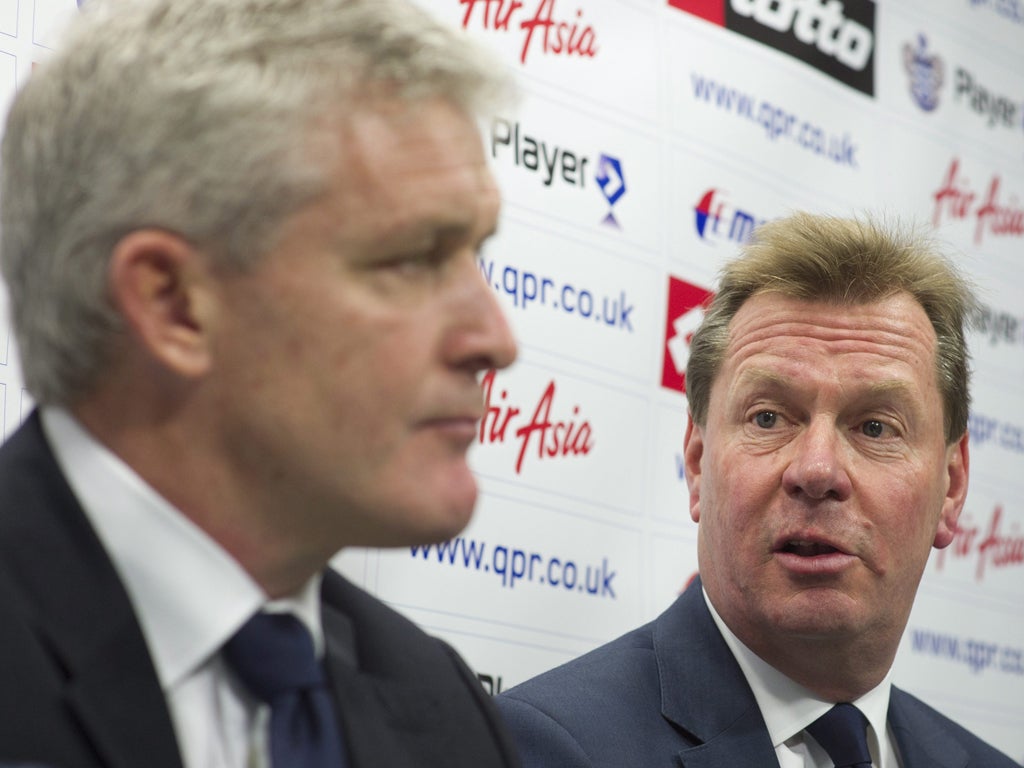High hopes for Hoops as Beard faces future
The man who saved the O2 now plans to make west London's unfashionable club into a money-spinner with Mark Hughes at helm

For a man who helped transform the Millennium Dome from a supposed white elephant into one of Europe's foremost concert venues, turning Queens Park Rangers into a force in English football should be a doddle. Philip Beard does not put it quite like that, of course, for even as a comparative newcomer to the unpredictable world of football – having joined QPR as chief executive after Tony Fernandes's takeover in August – he appreciates that those who sit in the directors' box are at the mercy of what goes on inside the rectangle of white lines in front of them.
Unless board members are inclined, like a previous Rangers owner, to send messages to the touchline demanding substitutions or tactical changes, all they can do is hire and fire the right people, and provide the financial backing and best possible working conditions.
To that end, Fernandes and his team deemed it necessary a week ago to dispense with the services of Neil Warnock, who had achieved the Premier League status that made the club such an attractive acquisition in the first place, and install Mark Hughes, a man considered to have a better chance of maintaining and building on it.
The building will be literal as well as metaphorical, involving a new training ground plus academy and, as this newspaper revealed when Fernandes arrived, a new stadium. "I don't think it would have got us Mark Hughes as manager," Beard says, "if the plan we'd laid out to him was that for the next 10 years he'd be training at Harlington or playing his team at Loftus Road."
The current training ground, under the Heathrow flight path, is the ramshackle place used by Chelsea when Hughes joined them as a player more than 15 years ago, when London University students would arrive after lunch to reclaim the dressing-rooms.
Rangers have identified a site for a replacement, which will prove easier to construct and finance than a new Loftus Road. The key to both, Beard says, is what businessmen apparently call "sweating the asset", or as he puts it: "Our plan is to build a multi-use stadium where the main tenant is Queens Park Rangers but we'll look to monetise other aspects of the stadium because that's what the current climate needs for investors to become part of the project. It's about funding it, making the numbers work. But this area is fantastic, the catchment area is great, the transport links are great.
"Coming from the O2, if we can build a venue that will be more than the home of QPR – while that will be the main part – I think we can do things that will be exciting for the area. And if and when we build a new stadium we will need to grow the fanbase significantly, so my job off the pitch is to start thinking about how we grow the brand that is QPR not just domestically but internationally."
The new regime clearly cannot be faulted for lack of either ambition or cash. As well as Fernandes, the owner of AirAsia and the Team Lotus/Caterham Formula One team, they are backed by the Mittals, whose pater familias Lakshmi is the world's fifth or sixth richest man, depending on who is doing the sums.
Yet the need to "grow the fanbase" acknowledges that Rangers have never been regarded as a big club in their 126-year history. The longest period they have ever enjoyed in the top flight was from 1983 to 1996; last season's average attendance in a Championship-winning season was under 16,000; and 25 years ago there were plans to merge with neighbouring Fulham.
Fulham, where to Hughes's frustration last summer a rich owner decided to put a cap on spending, are one of the clubs Beard mentions as a benchmark to aim at in terms of having got into the Premier League and stayed there. Stoke are another, though a few seasons ago he might have named Charlton or Southampton.
Clearly a man with a plan, he lays out the following path for the short, medium and long term: "We want to stay in the Premier League and stabilise in the short term. The short to medium term [aim] is to build a new training ground and encourage and attract players to come. The medium to long is to build a new stadium. It's crazy to speculate on how long it would take to get to the stage where you're competing for a Champions League place or the title, but if you don't have those dreams and goals, there's not much point in doing this."
Hasten slowly may be a sensible policy, or as Hughes put it, "don't run before you can walk". Beard, having helped secure the Olympics for London and built a future for the doomed Dome, prefers the line with which he signs off his programme notes: "Dare to dream."
Newcastle United v Queens Park Rangers is on Sky Sports 1 today, kick-off 1.30pm
Subscribe to Independent Premium to bookmark this article
Want to bookmark your favourite articles and stories to read or reference later? Start your Independent Premium subscription today.

Join our commenting forum
Join thought-provoking conversations, follow other Independent readers and see their replies